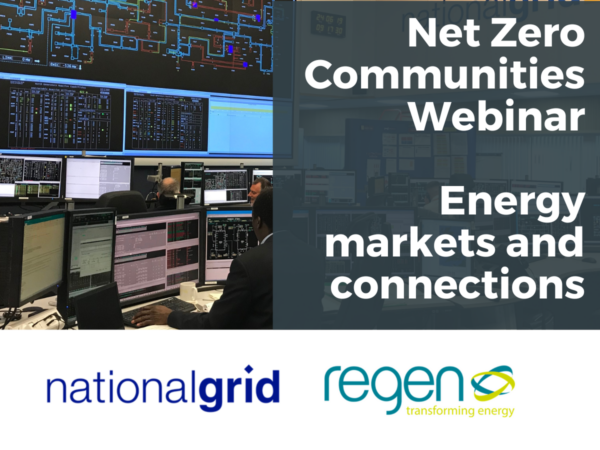
This webinar forms part of a series of six events (two online and four in-person) that Regen is delivering for NGED as part of its community energy support. In response to asks from community energy organisations, energy markets and connections formed the topics of discussion at this first online event. In this blog post, we have summarised the main insights from the webinar.
Electricity market reforms and local energy markets
The webinar began with a focus on electricity markets. Ellie Brundrett, net zero project manager at Regen, provided an overview of the Review of Electricity Market Arrangements (REMA). REMA, the first significant exploration of wholesale market reform since 2013, aims to ensure that we have appropriate market mechanisms in place to facilitate decarbonisation of the energy system by 2035. These reforms span the potential introduction of a whole host of reforms in the wholesale market through to areas such as flexibility, operability and capacity adequacy. Ellie highlighted the recently published REMA consultation as a crucial opportunity to provide clarity on the trajectory of wholesale energy market operations and to shape the future energy market.
Dr. Jeff Hardy, director of Sustainable Energy Futures, then discussed the challenges and opportunities of developing local energy markets. He explained that while there is an increasing appetite for local energy supply systems, it is not currently easy to do and most local models involve an energy supplier. He used a hypothetical case study to set out the range of potential options, from Power Purchase Agreements (PPAs) to peer-to-peer marketplaces, emphasising that the most suitable options depend on the type of consumers involved. He also noted the barriers that are currently impeding progress in this area, including regulatory constraints, limited investment or innovation in this space and a prevailing focus on supply-side solutions over demand-side management. He also raised the need for regulatory change such as the previously proposed local electricity bill.
Following the presentations, a lively Q&A session ensued providing participants with an opportunity to delve deeper into the nuances of the REMA reforms and local energy market options. Discussions ranged from the role of third-party agents in facilitating community energy projects to the importance of trust and transparency in the energy system. It was evident from the discussion that the community energy sector is keen to be involved in the future progress of REMA.
Connecting to the network
In the second part of the webinar, Kester Jones, head of connections at National Grid, outlined the challenges and initiatives aimed at enhancing the grid connection process for renewable energy projects. In the context of a significant surge in connection applications, including an expected increase in domestic applications, National Grid faces the challenging task of accelerating the grid connection process to ensure the timely deployment of renewable energy infrastructure.
Kester explained that reforms are underway to streamline the grid connection process and prioritise shovel-ready projects. The three-step action plan at the distribution level includes reforming the queue through enforcing milestones and removing stalled projects, thereby moving away from the old process of ‘first come, first served’ to ‘first ready, first connected’. National Grid is also improving the process through better coordination of connections across the transmission and distribution networks and through treating curtailment of controllable electricity storage as demand side response.
Kester also introduced the National Grid Clear View Connect platform which aims to enhance transparency in the connection process. By providing stakeholders with insights into the grid connection queue dynamics, Clear View Connect can be used by community energy organisations to help make informed decisions.
Following the presentation, questions covered the modelling of curtailment for flexible connection offers, Clear View Connect and the visibility of removed projects from the connection queue. As the webinar drew to a close, participants were also told about the new National Grid innovation project on Rural Energy and Community Heat (REACH). This project will focus on tackling the unique challenges presented by rural decarbonisation. You can read more about the project here.
To keep up to date with our future community energy events, please sign up for the mailing list here.
Our latest update on REMA is available here: Second REMA consultation: A significant step forward, despite pre-election politics – Regen
